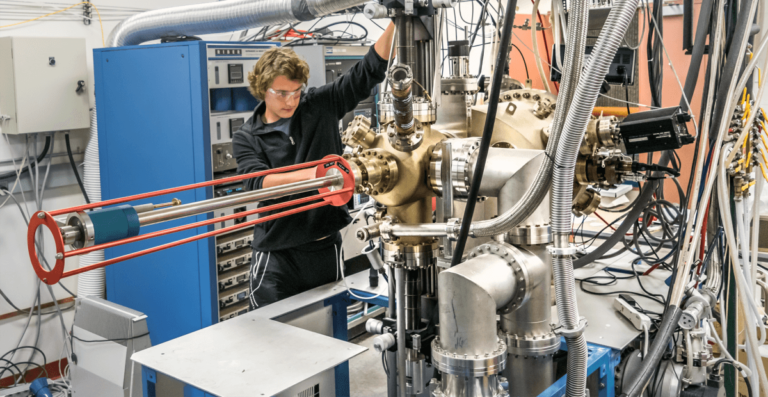
When it comes to engineering, the more common disciplines associated with the industry tends to be civil, electrical, mechanical or aerospace engineering.
The engineering world is so vast that there are several disciplines that may not be as popular, but are just equally as important and exciting to work in.
One such discipline is materials science and engineering – the study of all materials – where engineers design and discover new materials for new applications, as well as enhance performance on existing materials.
This has led to the development of all kinds of materials that we use in our everyday lives, from computer chips to biomedical devices to composites.
As we head into Industry 4.0, the world will need more engineers who have a thorough understanding of how materials work. This is due to rapid developments in the field of nanotechnology, 3D printing, machine learning and automation.
These technologies are spurring innovation in materials engineering, leading to rapid advancement and breakthroughs in the field.
In the past, materials science and engineering centred around traditional materials such as wood and ceramics. Today, these engineers are working on materials like biomaterials, nanomaterials, sustainable materials, and advanced manufacturing.
The field is also multidisciplinary in nature due to all the different elements involved in materials science. Materials engineers need to have an understanding of how physics, mathematics, biology and chemistry come together in a cohesive way.

Source: Michigan Technological University
This provides students with an exciting and dynamic academic experience while equipping them with transferrable skills such as collaboration, innovation, creativity and critical thinking.
Interested to work in the dynamic and innovative world of materials science and engineering? A degree in this discipline will allow you to work in a wide range of jobs across several different industries.
Here are four universities in the US and Canada that are leading the way for developing progressive engineers in this field.
DEPARTMENT OF MATERIALS SCIENCE AND ENGINEERING, MICHIGAN TECHNOLOGICAL UNIVERSITY – USA
Housed under the College of Engineering, this Department offers the Bachelor of Science, Master of Science, and PhD in Materials Science and Engineering. All Michigan Tech MSE students learn to imagine, simulate, and create innovative new products.
This unique program has excellent material processing facilities where students are able to actually make the materials and creations they envision and design. Access to these facilities—and the strong hands-on focus—is unique among materials programs and provides opportunities to also make a positive impact on the world.
The small size of the department offers an ideal learning environment. MSE students develop close working relationships with their peers, and experience invaluable mentoring by department faculty and staff members leading to lifelong networks and collaborations.
State-of-the-art characterisation facilities and laboratories complete the learning circle, enabling students to examine material structure at several dimensional scales—ranging from nanometers to millimeters—using advanced optical and electron microscopes. Measurements of material properties are also emphasised.
Thanks to Michigan Tech’s exceptional opportunities for learning and practical experience, an MSE degree from Michigan Tech typically qualifies graduates for a wide variety of high-skilled job options in several industries, including materials manufacturing, automotive, aerospace, consumer products, and research and development. The department also reports a 100 percent job placement rate, and higher-than-average starting salaries.
TICKLE COLLEGE OF ENGINEERING, UNIVERSITY OF TENNESSEE AT KNOXVILLE – USA
At this university, the Bachelor of Science in Materials Science and Engineering allows students to develop a comprehensive understanding of general engineering principles as well as the discipline of materials science and engineering.
The extensive research programme here receives approximately US$6 million in research funding each year, leading to several research opportunities in cutting-edge technology for undergraduate students, such as through paid part-time research assistantships.
With a low student-faculty ratio (about 4:1) in the College of Engineering, students receive plenty of individual interaction with faculty members, particularly in laboratory courses.
These laboratory classes also allow for hands-on learning in core subjects where students learn the processing and testing of materials while being introduced to modern processing and characterisation technique.
Students also benefit from the many event held by materials-related professional societies at the university each year, such as the American Society for Materials and the Society of Plastics Engineers.

Source: Shutterstock
DEPARTMENT OF MATERIALS SCIENCE AND ENGINEERING, UNIVERSITY OF CALIFORNIA, IRVINE – USA
Students in the Bachelor of Science in Materials Science and Engineering programme at this highly-ranked university in California not only learn the fundamental aspects of MSE such as the properties and characteristics of materials, they also develop, design, make, test and use materials and material systems for specific applications.
They learn about 3D printing and rapid prototyping technologies in one of two maker spaces on campus: Rapidtech and FABWorks.
Students also have opportunities to use advanced imaging techniques such as scanning electron microscopy as part of the curriculum.
Throughout their course, UCI students learn how to fabricate and process materials, characterise their structure, predict their properties, examine and modify material behaviour, and improve material performance as relevant to a broad range of technologies including Electronic, Information and Communication Technology; Energy Generation, Storage and Delivery; and Biosensors and Medical Devices.
Another added benefit is the school’s close ties with a large local engineering industry. Students regularly secure internships with companies such as Broadcom, Boeing, Ceradyne/3M, Lockheed Martin, and Edwards Lifesciences.
DEPARTMENT OF MATERIALS ENGINEERING, UNIVERSITY OF BRITISH COLUMBIA – CANADA
At this university in Vancouver, Canada, students can undertake advanced graduate programmes in the field of materials science and engineering.
Through these programmes, students work in impactful materials research that focuses on the development of new processes and process models primarily for novel materials in the transportation sector and biomaterials for medical applications.
Students in the Master of Science in Materials Engineering programme develop a deep understanding in the fields of casting and solidification of metals, ceramic processes and properties, corrosion, composite material processing and properties, hydrometallurgy and electrorefining, physical metallurgy, pyrometallurgy, remelting processes, thermomechanical processing and environmental processing.
The Department’s laboratories and offices for graduate students are located in the Advanced Materials and Process Engineering Laboratory (AMPEL) – an interdisciplinary facility on campus that brings together materials researchers from departments such as physics, chemistry and mechanical engineering.
This promotes an interdisciplinary environment that offers students valuable hands-on training, preparing them for leadership roles in the industry when they graduate.
These universities provide the ideal platform for students in materials science and engineering to launch lucrative and exciting careers in a rapidly advancing field.
*Some of the institutions featured on this article are commercial partners of Study International
Liked this? Then you’ll love…
Become an engineering leader in robotics and IoT at Northeastern University
Get ahead of the engineering curve with an innovative degree in Mechatronics or Electronics







